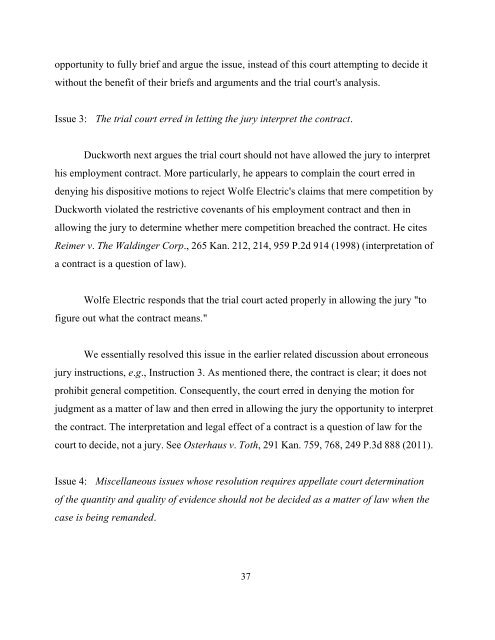Kansas Supreme Court - 99536 â Wolfe Electric, Inc. v. Duckworth
Kansas Supreme Court - 99536 â Wolfe Electric, Inc. v. Duckworth
Kansas Supreme Court - 99536 â Wolfe Electric, Inc. v. Duckworth
Create successful ePaper yourself
Turn your PDF publications into a flip-book with our unique Google optimized e-Paper software.
opportunity to fully brief and argue the issue, instead of this court attempting to decide it<br />
without the benefit of their briefs and arguments and the trial court's analysis.<br />
Issue 3: The trial court erred in letting the jury interpret the contract.<br />
<strong>Duckworth</strong> next argues the trial court should not have allowed the jury to interpret<br />
his employment contract. More particularly, he appears to complain the court erred in<br />
denying his dispositive motions to reject <strong>Wolfe</strong> <strong>Electric</strong>'s claims that mere competition by<br />
<strong>Duckworth</strong> violated the restrictive covenants of his employment contract and then in<br />
allowing the jury to determine whether mere competition breached the contract. He cites<br />
Reimer v. The Waldinger Corp., 265 Kan. 212, 214, 959 P.2d 914 (1998) (interpretation of<br />
a contract is a question of law).<br />
<strong>Wolfe</strong> <strong>Electric</strong> responds that the trial court acted properly in allowing the jury "to<br />
figure out what the contract means."<br />
We essentially resolved this issue in the earlier related discussion about erroneous<br />
jury instructions, e.g., Instruction 3. As mentioned there, the contract is clear; it does not<br />
prohibit general competition. Consequently, the court erred in denying the motion for<br />
judgment as a matter of law and then erred in allowing the jury the opportunity to interpret<br />
the contract. The interpretation and legal effect of a contract is a question of law for the<br />
court to decide, not a jury. See Osterhaus v. Toth, 291 Kan. 759, 768, 249 P.3d 888 (2011).<br />
Issue 4: Miscellaneous issues whose resolution requires appellate court determination<br />
of the quantity and quality of evidence should not be decided as a matter of law when the<br />
case is being remanded.<br />
37
















